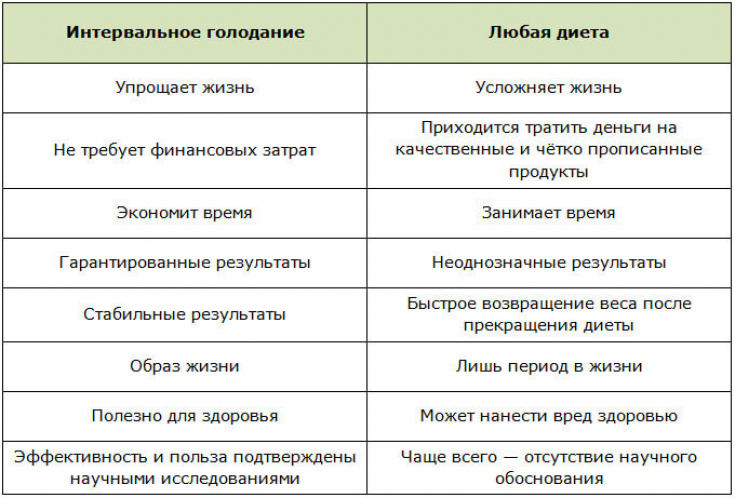Intermittent Fasting – a popular weight loss technique among Hollywood stars and many famous personalities. It is written about in glossy publications, it is recommended by many bloggers. But what is intermittent fasting and how can it help you lose weight or improve your health, how is it different from diets?
The editors of estet-portal.com will tell you everything about what intermittent fasting is, how it is useful for the body and how to properly restrict yourself in food in order to improve your health, and not harm it.
Intermittent fasting: reviews and benefits for the body
Intermittent or intermittent fasting – a method during which the day is divided into two conditional "windows". And all meals need to fit in one of them – most often the first. For example, 8 hours – a window for eating, and 16 – starvation.
There are several power schemes:
• 20/4;
• 16/8 – most common scheme;
• 14/10 – the most gentle option;
• 1/6 – here we mean one day of fasting and six – your usual diet.
Follow our page on Instagram!
Why is interval nutrition, reviews of which can be found on the Web, so popular? First of all, the technique helps to lose extra pounds. In addition, this type of fasting affects the body in the following ways:
• decrease in blood sugar;
• prolongs youth by rejuvenating body cells;
• improvement of hormonal levels and increased immunity;
• improvement of the gastrointestinal tract;
• reduction of inflammatory processes;
• lack of fermentation in the intestines or stomach;
• lower cholesterol levels.
As a result, intermittent fasting fans feel healthier and more alert, easier and faster to fall asleep and wake up, easier to endure stress.
Read also: Fasting every other day as a method of losing weight and restarting metabolism
Intermittent fasting rules
The most common type of fasting – it's a 16/8 pattern. That is, for eight hours you can eat whenever you want, and the remaining sixteen – hunger. This means that you can allow, for example, an early dinner, then the night and morning go without eating, and at lunch you can already eat.
And you need to follow these rules: xxxx>1. In the evening, you can drink tea without sugar, and start the morning with a cup of coffee or green tea.
2. If you can't live without breakfast, then you can shift the schedule so that you refuse dinner, but eat in the morning.
3. Despite the fact that there are no food prohibitions for intermittent fasting, you need to follow proper nutrition. That is, you can’t have breakfast or dinner with something fatty and high-calorie.
4. Don't forget about training. During the fasting period, they should be moderate, because the body receives less calories. Suitable for long walks, dancing, running.
5. It is also better to give up alcohol for the period of intermittent fasting.
While intermittent fasting, keep an eye on your well-being. If it worsens, then such a diet should be stopped immediately and consult a doctor. This will help to avoid health problems.
Read also:
What kind of detox soup will help you get in shape: 5 simple recipes
It is also better to give up alcohol for the period of intermittent fasting.
While intermittent fasting, keep an eye on your well-being. If it worsens, then such a diet should be stopped immediately and consult a doctor. This will help to avoid health problems. It is also better to give up alcohol for the period of intermittent fasting.
It is also better to give up alcohol for the period of intermittent fasting.
While intermittent fasting, keep an eye on your well-being. If it worsens, then such a diet should be stopped immediately and consult a doctor. This will help to avoid health problems.
What kind of detox soup will help you get in shape: 5 simple recipes
Intermittent fasting: are there any contraindications
Any diet or nutrition system has certain contraindications associated with its effect on the human body. If you are healthy, then there are no restrictions – You can experience intermittent fasting for yourself and expect positive results. However, if there are health problems, you should refrain from such a method of losing weight.
Contraindications to intermittent fasting are: diabetes mellitus;
• previous heart attack or stroke;
• thrombophlebitis.
In any case, if you decide to start intermittent fasting, it is best to consult with your doctor. Also, do not forget that this weight loss system should be moved gradually, and not abruptly. It is better to start with the so-called fasting days
– skipping meals once a week or eating only 500-700 calories a day. This will help the body to adapt properly. An abrupt transition can only worsen the condition.Interval nutrition: what is the point
Watch on YouTube:





Add a comment